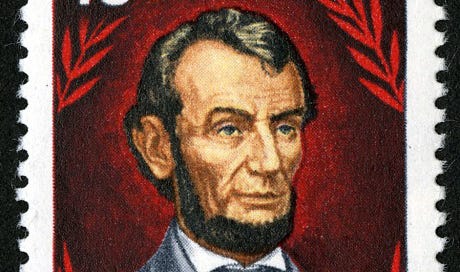The [Almost] Social Democratic Abraham Lincoln
socialism as a scare tactic is older than we realize
It seems strange that Americans still argue over the cause of the Civil War. Some of it is pride, as the great Civil War historian Wesley Moody once told me that for many Southerners, “it is hard to admit to your grandchildren that you fought for slavery and you didn't do a good job.” But for others, the reasons are more base and political: in the search for radical capitalist autonomy, Lincoln, and the nation-state of obstacles.
Abraham Lincoln not only believed that America was a nation-state—the late eminent historian Carl Degler called him the American Bismarck—he believed that the state existed to allow the people to freely own themselves. If you didn't own your labor, then you were not free, and if you accepted the principle that some men could own the labor of other men, then the freedom you held was at risk. The owners of other men only had to decide that you, too, fell into the category of men to be exploited. This, to an extent, explains post-industrial America: race-neutral, equal-opportunity labor exploitation.
For the exploitative, the idea that oligarchic power could be challenged and the political-economic system reordered to serve the many is the dangerous legacy of Abraham Lincoln's victory in the Civil War.
The year before he was elected president, Lincoln laid out his vision in his address before the Wisconsin State Agricultural Society in 1859. Lincoln was responding to the mudsill theory of South Carolina's U.S. Senator James Hammond, one of the most cruel and articulate slaveholders. Hammond introduced his so-called mudsill theory in March 1858 from the floor of the United States Senate, arguing that society requires a permanent underclass to perform menial and labor-intensive work, much like the mudsills that form the foundation of a building. Alluding to pagan Athens, Hammond used this theory to defend slavery, claiming that a "mudsill" class—specifically African slaves—was necessary for civilization to function and progress. To Hammond, you must have an exploited underclass for the elite to be elevated to their status. He claimed that by relegating drudgery to slaves, the Southern elite could spend their time pursuing more intellectual and cultural endeavors like high politics and creating civilization. His obvious intent was to create a link between a normative social hierarchy and the institution of slavery in the American South, arguing that it was not only economically necessary but also beneficial for societal advancement.
But why limit this to slaves? In fact, some Southerners like Hammond argued that their slaves were better off than Northern workers who were "free." That point is often left out of popular understandings of the North's hardening attitude toward the South before the Civil War. Southern elites were publicly saying that White men who labored were worse off than slaves. But Northerners could escape the feeling that the logic of the South's argument was that white men like themselves would be better off if they were ruled by elites like the slaves were.
Hammond's speech was wild, going so far as to argue that the debate between the moral superiority of slavery in the South versus poor laborers in the North was nothing but semantics. And threatening that if voices in the North did not stop agitating for the end of slavery, then the South would agitate for white socialism in the North. Seriously, he said:
Why, you meet more beggars in one day, in any single street of the city of New York, than you would meet in a lifetime in the whole South. We do not think that whites should be slaves either by law or necessity. Our slaves are black, of another and inferior race. The status in which we have placed them is an elevation. They are elevated from the condition in which God first created them, by being made our slaves. None of that race on the whole face of the globe can be compared with the slaves of the South. They are happy, content, uninspiring, and utterly incapable, from intellectual weakness, ever to give us any trouble by their aspirations. Yours are white, of your own race; you are brothers of one blood. They are your equals in natural endowment of intellect, and they feel galled by their degradation. Our slaves do not vote. We give them no political power. Yours do vote, and being the majority, they are the depositaries of all your political power. If they knew the tremendous secret, that the ballot-box is stronger than "an army with banners," and could combine, where would you be? Your society would be reconstructed, your government overthrown, your property divided, not as they have mistakenly attempted to initiate such proceedings by meeting in parks, with arms in their hands, but by the quiet process of the ballot-box. You have been making war upon us to our very hearthstones. How would you like for us to send lecturers and agitators North, to teach these people this, to aid in combining, and to lead them!
Accusations of pushing socialism as a racial and economic scare tactic is older than we realize, predating the Cold War by almost a century.
Abraham Lincoln countered this argument with what would become Republican and abolitionist orthodoxy: "labor is prior to, and independent of, capital; that, in fact, capital is the fruit of labor, and could never have existed if labor had not first existed—that labor can exist without capital, but that capital could never have existed without labor." Lincoln struck back with the plain arguments of a poor boy who worked to make himself into a great man. He had labored, worked hard, and made something of himself. He and others like him were no man's slaves or mudsills.
In his talk, Lincoln focused on agricultural innovation and economic progress. He explained the relationship between free labor and technological advancements in farming. He emphasized how these improvements could benefit both farmers and society as a whole; labor and capital. To Lincoln, labor was dignified; it was free labor that was essential for both individual and societal progress, not merely having someone do the hard jobs as a slave. It mattered that the worker was a free man who was paid what he was due. And Lincoln rejected a bold permanent demarcation between "capital" and "labor" because he knew that many workers bet on themselves, as we would say today, and they combined their acquired capital with continuing to labor alongside their workers, or even their slaves in the South.
It is not forgotten that a considerable number of persons mingle their own labor with capital; that is, labor with their own hands, and also buy slaves or hire freemen to labor for them; but this is only a mixed, and not a distinct class. No principle stated is disturbed by the existence of this mixed class. Again, as has already been said, the opponents of the "mud-sill" theory insist that there is not, of necessity, any such thing as the free hired laborer being fixed to that condition for life.
If it seems like Lincoln is making an allowance for slavery, know that he was setting his rhetorical opponents up. He went on to point out how the mudsill proponents rejected education as something good for the poor, even whites. He jokes that if Northern capital could make a mindless laborer, the South would celebrate it. "A Yankee who could invent strong handed-men without a head would receive the everlasting gratitude of the ‘mud-sill’ advocates." Was that to be the future of progress?
Lincoln answered:
But Free Labor says "no!" Free Labor argues that, as the Author of man makes every individual with one head and one pair of hands, it was probably intended that heads and hands should cooperate as friends; and that that particular head, should direct and control that particular pair of hands. As each man has one mouth to be fed, and one pair of hands to furnish food, it was probably intended that that particular pair of hands should feed that particular mouth—that each head is the natural guardian, director, and protector of the hands and mouth inseparably connected with it; and that being so, every head should be cultivated, and improved, by whatever will add to its capacity for performing its charge. In one word Free Labor insists on universal education.
Americans have forgotten what the Civil War was about. It was about racial despotism by elites who insisted on also ruling the other white people in America. It was about slaveholding oligarchs who rejected the idea of free progress with open exploitation and how they deceived poor Whites into following them. How they kept poor whites uneducated and supporting a slave-economy that undermined white wages in the name of "freedom" and "states-rights." And when Lincoln and the original Republicans won the election of 1860 by saying "No, we do not consent to spreading your slavery mudsill," the Southern elite went to war. And lost. Americans should recover Abraham Lincoln's appreciation for the labor and the right of American workers to profit from just wages from their own labor. Lincoln realized during the Civil War that to protect the national system for the good of free whites, he had to free the Africans; their fates were linked. In 1865, that wasn't socialism; it was an almost social democracy.





